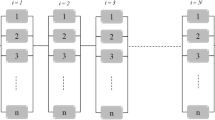Abstract
The problem of sensitivity of a redundant system’s probability characteristics to shapes of the input distributions is considered. In some previous works, closed-form representations have been obtained for stationary characteristics of hot-standby redundant systems with exponential lifetime distribution of their elements and general distribution of their repair time. In the current paper we carry out the sensitivity analysis of a k-out-of\(-n \):F system with the help of a simulation approach. Comparison of analytic and simulation results is presented.
The publication has been prepared with the support of the “RUDN University Program 5–100” (problem setting and simulation model development) and funded by RFBR according to the research projects No. 20-01-00575 (recipient Vladimir Rykov, review and analytic results) and No. 19-29-06043 (recipient Dmitry Kozyrev, formal analysis, validation).
Access this chapter
Tax calculation will be finalised at checkout
Purchases are for personal use only
Similar content being viewed by others
References
Kala, Z.: Sensitivity analysis in probabilistic structural design: a comparison of selected techniques. Sustainability 12(11), 19 (2020). https://doi.org/10.3390/su12114788
Kala, Z.: Quantile-oriented global sensitivity analysis of design resistance. J. Civ. Eng. Manage. 25(4), 297–305 (2019). https://doi.org/10.3846/jcem.2019.9627. ISSN 1392-3730, E-ISSN 1822-3605
Kala, Z.: Estimating probability of fatigue failure of steel structures. Acta et Commentationes Universitatis Tartuensis de Mathematica 23(2), 245–254 (2019). https://doi.org/10.12697/ACUTM.2019.23.21. ISSN 1406-2283, E-ISSN 2228-4699
Kala, Z.: Global sensitivity analysis of reliability of structural bridge system. Eng. Struct. 194, 36–45 (2019). https://doi.org/10.1016/j.engstruct.2019.05.045. ISSN 1644–9665
Sevast’yanov, B.A.: An ergodic theorem for Markov processes and its application to telephone systems with refusals. Theory Probab. Appl. 2(1), 104–112 (1957)
Kovalenko, I.N.: Investigations on analysis of complex systems reliability, p. 210. Naukova Dumka, Kiev (1976). (in Russian)
Rykov, V.: Multidimensional alternative processes reliability models. In: Dudin, A., Klimenok, V., Tsarenkov, G., Dudin, S. (eds.) BWWQT 2013. CCIS, vol. 356, pp. 147–156. Springer, Heidelberg (2013). https://doi.org/10.1007/978-3-642-35980-4_17
Gnedenko, B.V.: On cold double redundant system. Izv. AN SSSR. Texn. Cybern. 4, 3–12 (1964). (in Russian)
Gnedenko, B.V.: On cold double redundant system with restoration. Izv. AN SSSR. Texn. Cybern. 5, 111–118 (1964). (in Russian)
Solov’ev, A.D.: On reservation with quick restoration. Izv. AN SSSR. Texn. Cybern. 1, 56–71 (1970). (in Russian)
Efrosinin, D., Rykov, V., Vishnevskiy, V.: Sensitivity of reliability models to the shape of life and repair time distributions. In: 9th International Conference on Availability, Reliability and Security (ARES 2014), pp. 430–437. IEEE (2014) https://doi.org/10.1109/ARES.2014.65
Rykov, V., Kozyrev, D.: On sensitivity of steady-state probabilities of a cold redundant system to the shapes of life and repair time distributions of its elements. In: Pilz, J., Rasch, D., Melas, V.B., Moder, K. (eds.) IWS 2015. SPMS, vol. 231, pp. 391–402. Springer, Cham (2018). https://doi.org/10.1007/978-3-319-76035-3_28
Rykov, V., Zaripova, E., Ivanova, N., Shorgin, S.: On sensitivity analysis of steady state probabilities of double redundant renewable system with Marshall-Olkin failure model. In: Vishnevskiy, V.M., Kozyrev, D.V. (eds.) DCCN 2018. CCIS, vol. 919, pp. 234–245. Springer, Cham (2018). https://doi.org/10.1007/978-3-319-99447-5_20
Trivedi, K.S.: Probability and Statistics with Reliability, Queuing and Computer Science Application. Wiley, New York (2002)
Vishnevsky, V.M., Kozyrev, D.V., Rykov, V.V., Nguyen, Z.F.: Reliability modeling of an unmanned high-altitude module of a tethered telecommunication platform. Inf. Technol. Comput. Syst. (4) (2020). (in Russian) (in print)
Kozyrev, D.V., Phuong, N.D., Houankpo, H.G.K., Sokolov, A.: Reliability evaluation of a hexacopter-based flight module of a tethered unmanned high-altitude platform. In: Vishnevskiy, V.M., Samouylov, K.E., Kozyrev, D.V. (eds.) DCCN 2019. CCIS, vol. 1141, pp. 646–656. Springer, Cham (2019). https://doi.org/10.1007/978-3-030-36625-4_52
Kuo, W., Zuo, M.J.: Optimal Reliability Modeling: Principles and Applications. Wiley, New York (2003)
She, J., Pecht, M.G.: Reliability of a k-out-of-n warm standby system. IEEE Trans. Reliab. 41(1), 72–75 (1992)
Zhang, T., Xie, M., Horigome, M.: Availability and reliability of (\(k\)-out-of-\((M+N)\)): warm standby systems. Reliab. Eng. Syst. Saf. 91, 381–387 (2006)
Yuge, T., Maruyama, M., Yanagi, S.: Reliability of a (\(k\)-out-of-\(n\)) system with common-cause failures using multivariate exponential distribution. Procedia Comput. Sci. 96, 968–976 (2016)
El-Damcese, M., Shama, M.S.: Reliability analysis of a new k-out- of-n: G model. World J. Model. Simul. 16(1), 3–17 (2020)
Rykov, V., Kozyrev, D., Filimonov, A., Ivanova, N.: On reliability function of a k-out-of-n system with general repair time distribution. Probab. Eng. Inf. Sci. 1–18 (2020). https://doi.org/10.1017/S0269964820000285
Cox, D.: The analysis of non-Markovian stochastic processes by the inclusion of supplementary variables. In: Mathematical Proceedings of the Cambridge Philosophical Society, vol. 51, no. 3, pp. 433–441 (1955). https://doi.org/10.1017/S0305004100030437
Rykov, V.V., Kozyrev, D.V.: Analysis of renewable reliability systems by Markovization method. In: Rykov, V.V., Singpurwalla, N.D., Zubkov, A.M. (eds.) ACMPT 2017. LNCS, vol. 10684, pp. 210–220. Springer, Cham (2017). https://doi.org/10.1007/978-3-319-71504-9_19
Author information
Authors and Affiliations
Corresponding author
Editor information
Editors and Affiliations
Rights and permissions
Copyright information
© 2020 Springer Nature Switzerland AG
About this paper
Cite this paper
Rykov, V.V., Ivanova, N.M., Kozyrev, D.V. (2020). Sensitivity Analysis of a k-out-of-n:F System Characteristics to Shapes of Input Distribution. In: Vishnevskiy, V.M., Samouylov, K.E., Kozyrev, D.V. (eds) Distributed Computer and Communication Networks. DCCN 2020. Lecture Notes in Computer Science(), vol 12563. Springer, Cham. https://doi.org/10.1007/978-3-030-66471-8_37
Download citation
DOI: https://doi.org/10.1007/978-3-030-66471-8_37
Published:
Publisher Name: Springer, Cham
Print ISBN: 978-3-030-66470-1
Online ISBN: 978-3-030-66471-8
eBook Packages: Computer ScienceComputer Science (R0)




